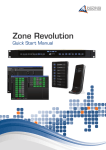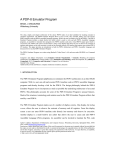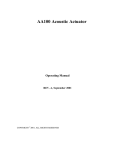Download AUSTRALIAN MONITOR K SERIES - Specifications
Transcript
INSTALLATION AND OPERATION MANUAL AMD SERIES MIXER AMPLIFIERS AMD100 AMD200 IMPORTANT SAFETY INFORMATION PRÉCAUTIONS DURANT UTILISATION 1. Read these instructions. 1. LISEZ ces instructions. 2. Keep these instructions. 2. Tenez ces instructions. 3. Heed all warnings. 3. Notez tous les avertissements. 4. Follow all instructions. 4. Suivez toutes les avertissements. 5. Do not use this apparatus near water. 5. N’utilisez pas ce produit près de l’eau (la piscine, la plage, le lac, etc.). 6. Clean only with dry cloth. 6. Nettoyez seulement avec une étoffe sèche. 7. Do not block any ventilation openings. Install in accordance with the manufacturer’s instructions. 7. Ne bloquez aucuns troux de ventilation. Installez en accord avec les instructions du manufacturier. 8. Do not install near any heat sources such as radiators, heat registers, stoves, or other apparatus (including amplifiers) that produce heat. 8. 9. Do not defeat the safety purpose of the polarized or grounding-type plug. A polarized plug has two blades with one wider than the other. A grounding type plug has two blades and a third grounding prong. The wide blade or the third prong are provided for your safety. If the provided plug does not fit into your outlet, consult an electrician for replacement of the obsolete outlet. N’installez près aucunes sources de chaleur comme radiateurs, registres de chaleur, fours ou les autres équipements (y compris amplificateurs) qui produisent la chaleur. 9. Ne défaites pas le but de sécurité de la fiche polarisée ou base-type. Une fiche polarisée a deux tranchants avec un plus large que l’autre. Une fiche de base type a deux a deux tranchants et une troisième pointe de base, le tranchant large ou la troisième pointe est fourni pour votre sécurité. Si la fiche donnée ne conforme pas votre prise de contact, consultez un électricien pour remplacement de la prise de contact obsolète. 10. Protect the power cord from being walked on or pinched particularly at plugs, convenience receptacles, and the point where they exit from the apparatus. 11. Only use attachments/accessories specified by the manufacturer. 12. Use only with the cart, stand, tripod, bracket, or table specified by the manufacturer, or sold with the apparatus. When a cart is used, use caution when moving the cart/apparatus combination to avoid injury from tip-over. 13. Unplug this apparatus during lightning storms or when unused for long periods of time. 14. Refer all servicing to qualified service personnel. Servicing is required when the apparatus has been damaged in any way, such as power-supply cord or plug is damaged, liquid has been spilled or objects have fallen into the apparatus, the apparatus has been exposed to rain or moisture, does not operate normally, or has been dropped. 15. This appliance shall not be exposed to dripping or splashing water and that no object filled with liquid such as vases shall be placed on the apparatus. 16. Plug this apparatus to the proper wall outlet and make the plug to be disconnected readily operable. 17. Main plug is used as disconnected device and it should remain readily operable during intended use. In order to disconnect the apparatus from the mains completely, the mains plug should be disconnected from the mains socket outlet completely. 18. WARNING: To reduce the risk of fire or electric shock, do not expose this apparatus to rain or moisture. 19. An appliance with a protective earth terminal should be connected to a mains outlet with a protective earth connection. 10. Protegez le cordon de secteur contre être marchée dessus ou pincez en particulier aux fiches, aux douilles de convenance, et au point où ils sortent de l’appareil. 11. Seulement utilisez attachements/accessoires spécifiés par le manufacturier. 12. Utilisez seulement avec un chariot, un stand, un trépied, un support ou une table indiquée par le manufacturier, ou vendue avec l’appareil. Quand un chariot est utilisé, faites attention en déplaçant la combinaison d’appareil/chariot pour éviter de se déséquilibrer. 13. Arrachez la fiche du dispositif durant éclair et orage ou quand pas utilisé pour longues périodes de temps. 14. Référez au personnel qualifié de service pour toutes réparations. La réparation est donnée quand le système a été endommagé à n’importe façon, par exemple un fil ou une fiche endommagé(e) de la source d’alimentation. Avoir été exposé à pluie ou humidité, n’opère pas normalement, ou avoir été tombé. 15. L’appareil ne doit pas être exposé aux écoulements ou aux éclaboussures et aucun objet ne contenant de liquide, tel qu’un vase, ne doit être placé sur l’objet. 16. Branchez l’appareil à une source appropriée et faire que la prise à débrancher soit facilement accessible. 17. La prise du secteur ne doit pas être obstruée ou doit être facilement accessible pendant son utilisation. Pour être complètement déconnecté de l’alimentation d’entrée, la prise doit être débranchée du secteur. 18. AVERTISSEMENT: Pour éviter le risque d’incendie ou de chocs électriques, ne pas exposer cet appareil à la pluie ou à l’humidité. 19. Un appareil avec la borne de terre de protection doit être connecté au secteur avec la connexiion de terre de protection. PAGE 2 AMD100/200 INSTALLATION AND OPERATION MANUAL INTRODUCTION AND CONTENTS AMD 100/200 INTRODUCTION 3 The AMD series of mixer amplifiers from Australian Monitor represent a quantum leap forward in connectivity, controllability & flexibility in the constant voltage amplifier market. The AMD series allows a contractor to integrate the mixer amplifier to a third party control system, enable PC control, add ICON CP control panels for remote audio control or simply use the AMD amplifiers as standard mixer amplifiers. Add to this the power & flexibility of on board DSP processing & you have EQ, Dynamics, delay & level control all available to tailor your audio system to the most challenging of acoustic environments & deliver the highest possible sound quality for the end user. FRONT PANEL 4 REAR PANEL 5 THINGS TO KNOW 6 INSTALLATION & CONNECTION 7 Australian Monitor AMD series is the future of constant voltage amplification USING THE GUI 8–12 ICON-CP/AMD100-200 13 RS485 PROTOCOL 14–16 DIMENSIONS 17 SPECIFICATIONS 18–19 Revision 1.2 November 2010 WARNING! TO PREVENT FIRE OR SHOCK HAZARD, DO NOT USE THE PLUG WITH AN EXTENSION CORD, RECEPTACLE OR OTHER OUTLET UNLESS THE BLADES CAN BE FULLY INSERTED TO PREVENT BLADE EXPOSURE. TO REDUCE THE RISK OF FIRE OR ELECTRIC SHOCK, DO NOT EXPOSE THIS APPLIANCE TO RAIN OR MOISTURE. TO PREVENT ELECTRICAL SHOCK, MATCH WIDE BLADE PLUG TO WIDE SLOT, FULLY INSERT. CAUTION RISK OF ELECTRIC SHOCK DO NOT OPEN The lightning flash with arrowhead symbol, within an equilateral triangle, is intended to alert the user to the presence of uninsulated “dangerous voltage” within the product’s enclosure that may be of sufficient magnitude to constitute a risk of electric shock to persons. WARNING: TO REDUCE THE RISK OF ELECTRIC SHOCK, DO NOT REMOVE COVER (OR BACK). NO USER SERVICEABLE PARTS INSIDE. REFER SERVICING TO QUALIFIED SERVICE PERSONNEL. The exclamation point within an equilateral triangle is intended to alert the user to the presence of important operating and maintenance (servicing) instructions in the literature accompanying the appliance. Rating plate and caution marking are marked on the back enclosure of the apparatus AMD100/200 INSTALLATION AND OPERATION MANUAL PAGE 3 FRONT PANEL STEREO BGM AMD200 CHANNEL 1 CHANNEL 2 CHANNEL 3 CHANNEL 4 CHANNEL 5 CHANNEL 6 CHANNEL 7 1 CHANNEL 8 • STEREO 1 • STEREO 2 • STEREO 3 • STEREO 4 LEVEL 2 BASS TREBLE 3 MASTER 4 1 Mic/Line volume controls Used to adjust the volume of each corresponding Mic/Line Input. Front Panel volume control and the internal “Virtual” volume control are added together to give the overall total volume. For more information see page 6. 2 BGM Select Mutually exclusive Background Music selection buttons. Pressing a selected source turn BGM off. Level control adjusts the volume of the BGM. 3 Bass and Treble Controls Bass and Treble front panel tone control. Bass: 10 dB of cut and boost at 200 Hz Treble: 10 dB of cut and boost at 5 kHz 4 Master Volume Used to adjust the master volume. Overall master volume will always be a resultant of front panel, virtual volume and VCA volume. For more information see page 6. PAGE 4 AMD100/200 INSTALLATION AND OPERATION MANUAL REAR PANEL 2 115VAC,50-60Hz 230VAC,50-60Hz 12 11 10 9 8 7 6 1 Mic/Line inputs Balanced mic/line input connector on a 3.81 mm pluggable connector. 2 Mic/Line Dip Switches The dip switches allow you to adjust the sensitivity or add a pad to the corresponding input. Only one DIP switch should be high at a time. 5 4 1 3 1 7 Logic Controls Low Power Mode: When Low Power mode is connected to ground the unit will enter low power mode. Evac, Bell, Alert and Chime: When one of these pins is connected to ground the corresponding tone will be triggered. VCA: When a RC1 or 500 kΩ pot is connected between the VCA pin and GND audio can be remotely controlled. Switch 1 pads the line (-20 dB) If a short circuit is placed between the VCA pin and GND it will result in a mute. Switch 2 Adds 15 db of gain Overall volume will always be a resultant of front panel, virtual volume and VCA volume. For more information please see page 6. Switch 3 Adds 30 db of gain Switch 5 Adds 45 db of gain 3 Phantom Power Switches Applies +34 VDC phantom power to the corresponding channels for electret or condensor microphones. VOX: The VOX output will go high when ever audio exceeds the threshold on the selected mic channels within the GUI. the factory default has this option turned off. The output from the VOX output is: +33 VDC at up to 200 mA This can be used to drive an attenuator bypass, relay or similar to indicate audio is present. 4 BGM RCA Inputs 4 Line level Background Music inputs on stereo RCA connectors. Stereo inputs are summed to mono for the amplifier, but remain stereo for the line level outputs 5 Line Level Outputs Provides left and right line level outputs on 3.81 mm pluggable connector. 8 USB For connection to the PC GUI. All DSP and adjustable settings are configured via USB. 9 RS485 Used for ICON Control Panel integration and also the 3rd party control. See page 14 for more details. 6 Phone The phone input shares Mic/Line 2. Only one of these inputs should be used at a time. 10 Battery Input 24 VDC input for emergency power systems. A suitable LIU (Line Interface Unit) will need to be used for most systems Specs: Nominal Level Input = 0 dBu 11 Amp Outputs 100 V ,70 V, 8 ohm or 4 ohm amplifier outputs. Bandwidth = 300 Hz to 3 kHz 12 230 V to 240 V / 115 V to 120 V This power input is NOT auto-switching, contact Australian Monitor if the unit needs to be changed from its shipped voltage configuration. AMD100/200 INSTALLATION AND OPERATION MANUAL PAGE 5 THINGS TO KNOW Virtual Volume Controls We have chosen to call some of the volume controls within the AMD series “Virtual Volume” controls. This is mainly because these control sit inside the DSP of the product but also to differentiate them from the front panel volume controls. The “Virtual Volume’s” are controlled from either the PC GUI, 3rd Party Control or the ICON Control Panel. The volume control in the PC GUI will move whenever one of the controls is gestured. The “Virtual Volume” is effectivly in series with the front panel volume control. The resultant volume control will always be a combination of the “Virtual” and front panel volume control providing the front panel is enabled. If the front panel has been disabled then the only way to control volume is via the PC GUI, 3rd Party Control or ICON Control Panels. ATTENTION: When enabling and disabling the front panel the chance of the output level reaching excessive levels is present. Please be sure to mute the outputs before adjusting these options. Updating Firmware To update firmware inside of the AMD100/200 you will need a connection with the PC software via USB. All firmware files for the AMD100/200 series have a filetype of .amfw, anything else will not be recognised by the software. All firmware files need to be placed inside the AMD software directory: C:/Program Files/Australian Monitor/AMD100 or AMD200/Firmware If a .amfw file is placed in that folder then all the user needs to do is go to Device > Update Firmware on the title bar of the GUI. From here you can pick which firmware file you want to load into the device. Australian Monitor suggests that you only ever update the firmware on a device when told to by Australian Monitor Tech Support. We also suggest that you always update to the most recent version of firmware unless told otherwise. Default Configuration Out of the box the AMD works as a regular mixer-amplifier. The default configuration is as follows: Volume controls: All set to 0 dB and Un-muted Bass and Treble Filter: Set to 0 (flat) Front panel Enabled VCA Enabled Priority Set Up: Mic/Line 1 = Medium (Level 2) Mic/Line 2 = Low (Level 1) Mic/Line 3-8 = None (Level 0) Bell = Medium (Level 2) Chimes = Medium (Level 2) All Tones set to -12 dB PAGE 6 AMD100/200 INSTALLATION AND OPERATION MANUAL INSTALLATION & CONNECTION System Requirments In order to use the AMD100/200 software it is recomended your computer meets the following requirments: CPU: 1.4 Ghz or higher Memory: 512 MB or more Hard Disk: 30 MB or more available Display: 1024 x 768 (16 bit) or higher OS: Windows XP SP2 or later, Windows Vista, Windows 7 Other: USB Connection Installation 1 Log on to Windows using an account with administrator privileges. 2 Double click on “AMD.100.msi” located where you downloaded the application to. 3 Perform the installation as per the on-screen instructions. 4 After the instllation is complete a folder should be created containing all the installation files (By default, “C:\Program Files\Australian Monitor”). 5 A shortcut will also be placed in the “Start Menu”. Connection: The connection between a PC and the AMD series amplifier is done over USB. The connection is plug and play so there is minimal set up required to get up and running. When you first connect a USB cable to the AMD amplifier and you open the AMD software GUI you should see in the bottom left hand corner a connection button (See picture 1). When the unit is first connected this should read “determining status” once this has been completed the unit should read “Offline – Connected” (See picture 2 & 3). This tells you that the GUI see’s an appropriate device at the end of the cable. If it reads “Offline Not Connected” then either the wrong software GUI has been used or the device cannot be found. Picture 1 Picture 2 Once the GUI has determined the status you can click on the connect button. This will bring up an option window asking you if you want to either “Send” or “Retrieve” the configuration settings (See picture 4). Picture 3 “Send” will send the current GUI settings to the connected AMD Device. “Retrieve” will poll the unit for its current configuration and download it to the GUI. Once this has been done the GUI will be connected to the AMD amplifier and you will be able to start adjusting volumes and DSP settings. Picture 4 AMD100/200 INSTALLATION AND OPERATION MANUAL PAGE 7 USING THE GUI Main Screen: The Main screen of the GUI is where most volume adjustments are made. From here you have control over the master output, mic/line inputs and the BGM selector. At the base of this screen there are five set up buttons to adjust features of the AMD series mixer amplifiers. Audio Setup: The Audio Setup page allows you to adjust all the DSP functions within the AMD Series. PAGE 8 AMD100/200 INSTALLATION AND OPERATION MANUAL USING THE GUI Input Level: Each input on the AMD100/200 contains a digital trim level control, this ranges from -96 dB to +12 dB. There is also an invert button to reverse the phase on that input. Input Dynamics: Each input on the AMD100/200 contains a compressor. Threshold, Ratio, Attack, Release and Output Gain may be adjusted. All adjustments are displayed on the graph to the right of the screen. Input EQ: Each input on the AMD100/200 contains EQ. The EQ features a Low Shelf, High Shelf and 2 parametric filters. All adjustments are displayed on the graph to the right of the screen. Output EQ/Filter: Each output of the AMD100/200 contains an EQ and Crossover. The crossover allows you to place a High Pass, Low Pass and All Pass filter on the signal. Each filter has a frequency adjustment, the All Pass filter also contains a Q width adjustment. From the drop down boxes below the filter adjustments you can change the filter slope, the options are: Butterworth 6 dB/Oct – 24 dB/Oct Linkwitz-Riley 12 dB/Oct – 24 dB/Oct Bessel 12 dB/Oct – 24 dB/Oct The EQ section of the output features a High Shelf, Low Shelf and 4 parametric filters. Both the crossover and the EQ section displayed on the graph to the right of the page. AMD100/200 INSTALLATION AND OPERATION MANUAL PAGE 9 USING THE GUI Output Delay: Each output of the AMD100/200 features delay adjustment. The adjustment is in the range of: Samples: 0 - 5952 Milliseconds: 0.00 – 124.00 Meters: 0.00 – 42.90 Feet: 0.00 – 140.76 Output Dynamics: Each output of the AMD100/200 features a compressor. Threshold, Ratio, Attack, Release and Output Gain may be adjusted. All adjustments are displayed on the graph to the right of the screen. Output Level: Each output of the AMD100/200 features an output level trim. This control ranges from -96 dB to +12 dB. PAGE 10 AMD100/200 INSTALLATION AND OPERATION MANUAL USING THE GUI Priority: The Priority window allows you to adjust which inputs have priority over others. There are four levels of priority in the AMD Series. Level 0 – No Priority Level 1 – Low Priority Level 2 – Medium Priority Level 3 – High Priority Level 4 – Highest Priority When two inputs share the same level of priority they will both stay active when the lower priority channels mute. The threshold at which the priority will become active is adjusted via the control at the top of the page. All inputs will trigger from the same audio level set from the priority threshold control. Bell and Chimes have selectable priority and can sit on any of the 5 levels. Evac and Alert are fixed to the highest level of priority. BGM sources are fixed to the lowest level of priority. Tones: The tone generator window allows you to adjust the volume of the tones present in the AMD Series. The following tones are available: Bell (Pre Master Level) Chimes (Pre Master Level) Alert (Post Master Level) Evac (Post Master Level) All tones volumes are by default set to -12 db. AMD100/200 INSTALLATION AND OPERATION MANUAL PAGE 11 USING THE GUI VOX Output: The VOX Output window allows you to adjust when the VOX Output is triggered and by what sources. The VOX Output threshold control allows you to adjust at what level the will VOX output will trigger The Vox logic is selectable as to which Mic/Line input it is triggered off. By default the Vox threshold is set to -35 db with no trigger source enabled. For more infomation about the VOX trigger output see page 5. Enable Setup: The Enable Setup window allows you to enable and disable VCA and Front Panel Control. If control is active the blue light will be activated next to that option. ATTENTION: When enabling and disabling either of these functions the chance of the output level reaching excessive levels is present. Please be sure to mute the outputs before adjusting these options. The volume controls inside the AMD Mixer amplifier are in series. There for having the GUI based volume control at a minimum but the front panel control at full will result in no audio. See page 6 for details. All three volume controls are in series. Overall volume will always be the resultant of front panel, virtual volume and VCA volume. The factory default has the front panel enabled and GUI based volume controls set to 0db so it performs like a normal mixer amplifier. PAGE 12 AMD100/200 INSTALLATION AND OPERATION MANUAL ICON-CP/AMD100-200 The ICON-CP can be used to control certain functions of the AMD100/200. The set up the control panel all you need to do is address the panel on SW1. Switch 1-8 represent a binary address. For example to address it to ID1 all you need to do is have number 1 on, to address it to 3 have switch 1 and 2 on. 1. BGM 1 SW2 C and D do not do anything, A and B adjust the LED settings of the panel. With switch A high ambient light adjustment will be turned on. With switch B on, low brightness mode will be activated. Only one switch should be up at a time. 3. BGM 3 2. BGM 2 4. BGM 4 5. BGM Off ID 1: 6. BGM Mute In this mode the first 5 buttons act as a source select (1-4 and off) 7. BGM Vol + The 6th button acts as a mute control Buttons 7 and 8 are volume up and volume down for the BGM source 8. BGM Vol - NOTE: BGM Off deselects all the BGM input. BGM Mute toggles and maintains the selected BGM source for easy unmuting. 1. Mic\Line 1 2. Mic\Line 2 ID 2: 3. Mic\Line 3 In this mode the panel acts as 6 individual volume controls. 4. Mic\Line 4 The first 6 buttons pick the volume you want to control and the bottom two buttons are volume up and volume down. 5. BGM 6. Master + Volume - Volume 1. Mic\Line 5 2. Mic\Line 6 ID 3: 3. Mic\Line 7 This mode is the same as two but controls different sources. Note, this is will work on AMD200 only. 4. Mic\Line 8 5. BGM 6. Master + Volume - Volume AMD100/200 INSTALLATION AND OPERATION MANUAL PAGE 13 RS485 PROTOCOL Port & Protocol Information Virtual Volume Controls: The AMD100/200 has a RJ45 connector on the rear of the unit. This connector is used for the ICON-CP control panel and also for controlling the device with an external control system via RS485. To adjust the virtual volume control of the mic/line inputs, BGM source or Master. Below is the pinout of the RJ45: %PVAL:xxyy<CR> “xx” represents the parameter ID to be adjusted and “yy” is the new value. Pin 1 = NC Pin 2 = GND Parameter ID’s 01 = Mic/Line 1 Volume Pin 3 = RS485-A 02 = Mic/Line 2 Volume Pin 4 = Power (+33 VDC, supplied by AMD100/200 up to 500 mA) 03 = Mic/Line 3 Volume Pin 5 = Power (+33 VDC, supplied by AMD100/200 up to 500 mA) 04 = Mic/Line 4 Volume Pin 6 = RS485-B 05 = Mic/Line 5 Volume Pin 7 = GND 06 = Mic/Line 6 Volume Pin 8 = NC 07 = Mic/Line 7 Volume All parameters are constantly updated in the AMD100/200. If a control is adjust by another source e.g. ICON-CP all control devices will be update (3rd Party control and PC Gui). 08 = Mic/Line 8 Volume Baud rate: 19200 0C = Master Volume Bits: 8 Parity: No The value of yy can range between 0x00 (off) and 0xE1 (225 = +12 dB of gain). This allows half dB steps throughout the range where for example: Stop bits: 1 0x00 = Off The protocol is an ASCII protocol – all characters in the string are ASCII chars. Abinary value ranging between hexadecimal 00 and FF is transmitted as two ASCII chars. All command strings start with the % character and end with a carriage return – shown as <CR> in this document and equal to the single ASCII value of 13 (0x0D). 0x01 = -100 dB 09 = Stereo BGM Volume 0xC9 = 0 dB 0xE1 = +12 dB To request the current level of a source: %PVAL:xx??<CR> where “xx” is the source. Available Parameters The following parameters can be externally controlled: Mic/Line Input 1 - 8 (1 - 4 for AMD100), BGM source and Master virtual volume control. When a volume is adjusted from another source e.g. ICON-CP the AMD100/200 will send: %PVAL=xxyy<CR> where “xx” is the source and “yy” is the current value. Mic/Line input 1-8 (1 - 4 for AMD100), BGM source and Master mute. BGM Source select Low Power Mode Virtual filter control (bass and treble) Filter bypass (bass and treble) Power amp fault indication PAGE 14 AMD100/200 INSTALLATION AND OPERATION MANUAL RS485 PROTOCOL Virtual Mute Flags BGM Source Select To toggle the mute control of Mic/Line 1-8, BGM source or Master. To select a BGM source. %PFLG:xxyy<CR> %PSRC:xx<CR> “xx” represents the parameter ID to be adjusted and “yy” is the new value of the flag. “xx” represents the source you want to select. Parameter ID’s 01 = BGM 1 01 = Mic/Line 1 Mute Flag 02 = BGM 2 02 = Mic/Line 2 Mute Flag 03 = BGM 3 03 = Mic/Line 3 Mute Flag 04 = BGM 4 04 = Mic/Line 4 Mute Flag The request the current value of the mute flag: 05 = Mic/Line 5 Mute Flag 06 = Mic/Line 6 Mute Flag 00 = Off %PSRC:??<CR> 07 = Mic/Line 7 Mute Flag If the BGM source is changed from another source e.g. ICON-CP the AMD100/200 will send: 08 = Mic/Line 8 Mute Flag %PSRC=xx<CR> where “xx” represents the current source 09 = Stereo BGM Mute Flag 0C = Master Mute Flag The value of “yy” should either be 00 or 01. 00 = Unmuted 01 = Muted To request the current value of the mute flag: %PFLG:xx??<CR> where “xx” is the source If a mute flag is enabled from another source e.g. ICON-CP the AMD100/200 will send: %PFLG=xxyy<CR> where “xx” is the source and “yy” is the current value Low Power Mode To place the enable or disable “low power mode” %PGRN:xx<CR> “xx” represents whether the unit is in low power mode of not. 00 = Normal Mode 01 = Low Power Mode 02 = Emergency Mode 03 = Emergency Mode with Low Power Mode To request the current value: %PGRN:??<CR> The device will respond with: %PGRN=xx<CR> where “xx” is the current state AMD100/200 INSTALLATION AND OPERATION MANUAL PAGE 15 RS485 PROTOCOL Virtual Filter Controls Power Amp Fault Indication To adjust the virtual filter control of the master Treble and bass controls. To poll the unit for its current fault status %PVAL:xxyy<CR> “xx” represents the parameter ID to be adjusted and “yy” is the new value. Parameter ID’s 0A = Bass Filter 0B = Treble Filter The value of “yy” can span between 0x00 (10 dB of cut) and 0x14 (10 dB of boost) To request the current level of a source: %PAMP=??<CR> The AMD100/200 will respond with. %PAMP=xx<CR> “xx” represents whether the unit is in amplifier fault mode 00 = Amp is running in normal mode 01 = Amp is in thermal shutdown 02 = Amp is in fault shutdown The PAMP command is a polled command, the AMD100/200 will not send data regarding the amp status unless explicitly requested to do so. %PVAL:xx??<CR> where “xx” is the source. When a filter is adjusted from another source e.g. the GUI the AMD100/200 will send: %PVAL=xxyy<CR> where “xx” is the source and “yy” is the current value. To request the current level of a source: %PVAL:xx??<CR> where “xx” is the source. Filter Bypass Flag To toggle the bypass control of the bass and treble filters. %PFLG:xxyy<CR> “xx” represents the parameter ID to be adjusted and “yy” is the new value of the flag. Parameter ID’s 0A = Bass Filter 0B = Treble Filter The value of “yy” should either be 00 or 01. 00 = Filter Inline 01 = Bypassed Operation To request the current value of the mute flag: %PFLG:xx??<CR> where “xx” is the source If a mute flag is enabled from another source e.g. ICON-CP the AMD100/200 will send: %PFLG=xxyy<CR> where “xx” is the source and “yy” is the current value PAGE 16 AMD100/200 INSTALLATION AND OPERATION MANUAL 44.00 mm (1.75”) DIMENSIONS 32.00 mm (1.25”) 482.00 mm (19.0”) 465.00 mm (18.3”) STEREO BGM AMD200 CHANNEL 1 CHANNEL 2 CHANNEL 3 CHANNEL 4 CHANNEL 5 CHANNEL 6 CHANNEL 7 CHANNEL 8 • STEREO 1 • STEREO 2 • STEREO 3 • STEREO 4 LEVEL BASS TREBLE MASTER 430.00 mm (16.9”) 115VAC,50-60Hz 230VAC,50-60Hz 330.00 mm (13.0”) AMD100/200 INSTALLATION AND OPERATION MANUAL PAGE 17 SPECIFICATIONS Specification Conditions Frequency response: Mic/Line Inputs ----->Line Level Output Mic/Line Inputs ----->Amp Output Stereo Inputs ---->Line Level Output Stereo Inputs ---->Amp Output 20-20 kHz, -3 dB 60-20 kHz, -3 dB 20-20 kHz, -3 dB 60-20 kHz, -3 dB Signal Input -2 dB below clip Signal Input -2 dB below clip Signal Input -2 dB below clip Signal Input -2 dB below clip Total Harmonic Distortion: Mic/Line Inputs ----> Line Level Output Mic/Line Inputs ----> Line Level Output Mic/Line Inputs ---> Amp Output Stereo Inputs ---> Line Level Output Stereo Inputs ----> Amp Output <0.05 % <0.1 % <0.5 % <0.05 % <0.5 % Input Impedance: Mic/Line Mic: Line: Stereo Input Max Input Mic/Line Input Stereo Input Mic/Line Pad Switch: Maximum Voltage Gain: Mic/Line Inputs 0 dB gain, Signal input -2 dB below clip 45 dB gain, Signal input -2 dB below clip Signal input -2 dB below clip Signal input -2 dB below clip Signal input -2 dB below clip 1.5 k 1.5 k 12 k 22 dBu 2 dBu 6 dBu Mic/Line pad on Mic/Line pad off 20 dB pad 45 dB With 45 dB gain switch (analog domain) Phantom Power: +34 VDC Available via individual switch on each mic/line channel Cross Talk: > 80 dB 1 kHz, input channel at clip, measured on line output of adjacent output S/N Ratio: Mic\Line Input Stereo Input > 92 dB > 91 dB A-weighted, to line and amp output, 20 Hz to 20 kHz A-weighted, to line and amp output, 20 Hz to 20 kHz Max Output Line Level Ouptut 10 dBu Balanced (+4 dBu unbalanced on each leg) PAGE 18 AMD100/200 INSTALLATION AND OPERATION MANUAL SPECIFICATIONS Specification Conditions Power Output - AMD100 4 ohm 8 ohm 70 V 100 V 100 W 100 W 100 W 100 W 20 Vrms 28.28 Vrms Power Output - AMD200 4 ohm 8 ohm 70 V 100 V 200 W 200 W 200 W 200 W 28.28 Vrms 40 Vrms Power Consumption - AMD100 Green Idle 1/8th Power 1/3rd Power 9W 15 W 32 W 60 W No control panel attached, 4 Ohm load No control panel attached, 4 Ohm load No control panel attached, 4 Ohm load No control panel attached, 4 Ohm load Power Consumption - AMD200 Green Idle 1/8th Power 1/3rd Power 9W 15 W 48 W 83 W No control panel attached, 4 Ohm load No control panel attached, 4 Ohm load No control panel attached, 4 Ohm load No control panel attached, 4 Ohm load Thermal Dissipation - AMD100 Idle 1/8th 15 W (51.18 Btu\Hr) 18.86 W (64.32 Btu\Hr) Pink noise 12 dB crest factor, typical of program music just before clip Thermal Dissipation - AMD200 Idle 1/8th 15 W (51.18 Btu\Hr) 24.25 W (82.74 Btu\Hr) Pink noise 12 dB crest factor, typical of program music just before clip Power Source AC Mains (230 V to 240 V / 115 V to 120 V) or +24 VDC Recommended Operating Temp Recommended Operating Humidity 10° C to 45° C (50° F to 113° F) 5 % to 95 % Dimensions (w x d x h) 430 mm x 330 mm x 44 mm (16.9” x 13” x 1.75”) Net Weight - AMD100 - AMD200 6 kg (13.2 lbs) 7 kg (15.4 lbs) Shipping Weight - AMD100 - AMD200 8 kg (17.6 lbs) 9 kg (19.8 lbs) Shipping Dimensions (w x d x h) AMD100/200 INSTALLATION AND OPERATION MANUAL Not including rack ears or front panel knobs 540 mm x 410 mm x 140 mm (21.3” x 16.1” x 5.51”) PAGE 19 ENGINEERED BY AUSTRALIAN MONITOR Address: 1 Clyde Street, Silverwater, Sydney NSW 2128 Australia. Private Bag 149, Silverwater NSW 1811 ABN 78 001 345 482 Website: www.australianmonitor.com.au International enquiries email: [email protected] DISTRIBUTED IN AUSTRALIA AND NEW ZEALAND BY HILLS SVL www.hillssvl.com.au NSW P: 02 9647 1411 E: [email protected] QLD P: 07 3852 1312 E: [email protected] ACT P: 02 6260 4544 E: [email protected] WA P: 08 9204 0200 E: [email protected] VIC P: 03 9890 7477 E: [email protected] SA NZ P: 08 8408 8300 P: 09 415 9426 E: [email protected] E: [email protected]

































